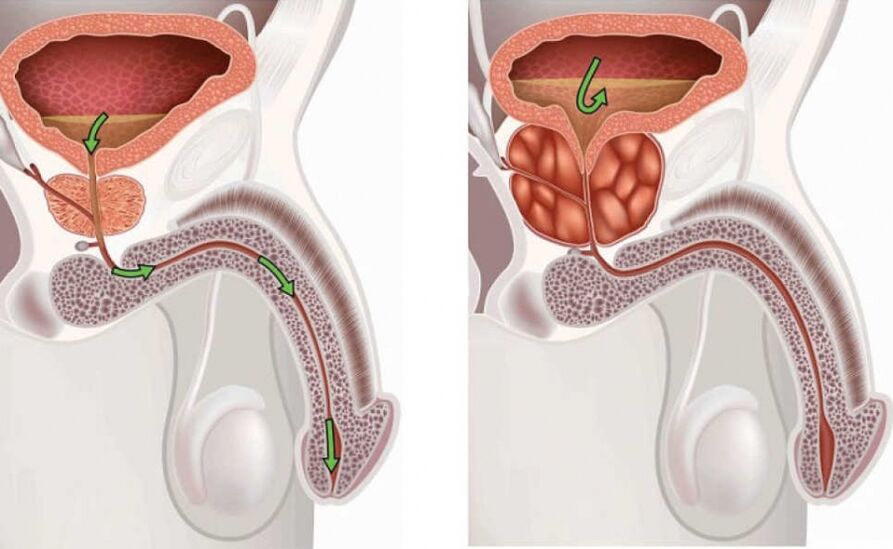Many people still feel embarrassed or hesitant to talk about certain illnesses.This is especially true for genitourinary problems, which can simultaneously cause discomfort and interfere with sexual activity.More than 70% of men will not see a doctor in the early stages of the disease, and treatment is most effective if the disease is not too advanced.Timely identification of disease symptoms is important for prevention and early treatment.
What is prostatitis
The prostate, or prostate, is located in the center of the pelvis and is connected to the bladder and spermatic cord.The main function is to produce a substance responsible for sperm motility and motility.From a chemical point of view, this secretion is the basis of immunoglobulins, to which vitamins, zinc, iodine are added - the basis of sperm nutrition and activity.The composition of the fluid is an important diagnostic parameter and helps in early identification of symptoms.

As you can guess from the name, this disease involves an inflammatory process in the prostate.This pathology is always associated with the presence of bacterial infection, although it does not necessarily occur in a form perceptible to humans.The type of disease progression depends largely on age, constitution, associated factors and physical characteristics.
Normally, the prostate cannot be felt or noticed.However, despite being located quite deep in the pelvic area, this organ is one of the most vulnerable in the male body.There is a belief that only older people experience symptoms of prostatitis, but this is not true: the disease is common in mature men between the ages of 20 and 60.
In the early stages, identifying this disease is quite difficult.Signs may appear from time to time, then bother you, and then disappear without a trace.Doctors mention that the psychology of men, especially young men, also plays a role: not everyone is ready to go to the doctor and admit to having a "shameful" disease.
At the same time, the disease is characterized by dangerous complications, including:
- Infertility due to impaired sperm motility.Sometimes, asymptomatic or mild chronic prostatitis becomes the only reason for a couple to be childless.A woman can get tested all she wants, but it won't help unless her husband decides to check his own fertilization ability himself.
- Prostate adenoma is a benign tumor that can become very dangerous for men.This is due to the anatomy - the location of the urinary tract and vas deferens - and if the prostate grows abnormally, it can interfere with normal urination.There is a risk of numerous complications, including bladder rupture.
- According to statistics, prostate cancer is one of the most common diseases among men.Oncological disease is one of the top ten causes of death in people over 50; in this age group, long-standing chronic prostatitis often worsens into life-threatening disease.
- Psychological issues related to erectile dysfunction, infertility, natural function issues.This is a side effect but also significantly affects the patient's quality of life.
Every twenty men over the age of thirty and more than half of the men over the age of fifty have symptoms of prostatitis.This is one of the most common diseases.Prevention, early diagnosis, and careful treatment can reduce the onset and complications of the disease.
Acute (bacterial)
This disease can appear in men of any age.If the chronic form of the disease is more common in older people, the acute bacterial form of the disease could theoretically occur in anyone.The bacteria that cause prostatitis symptoms can be pathogenic or opportunistic.
Please remember the following points about this form:
- You can become infected at any age, including through unprotected sex.
- Prostatitis is not the same as typical STDs (sexually transmitted diseases) such as gonorrhea, syphilis, chlamydia, etc., but can manifest as a secondary infection in the context of another disease.
- If your partner has candidiasis, ovarian inflammation, vulvitis, or vulvovaginitis, you may become infected, or you may pass the infection to her.Even a couple may continually re-infect the other if it happens that one partner becomes a "carrier" of the infection.
- The main cause of acute bacterial prostatitis is unprotected sexual intercourse, followed by hypothermia and other conditions that reduce local immunity.
chronic bacterial
Without appropriate treatment and neglect of symptoms in the acute form, as well as regular reinfections, there is a high risk of developing a chronic pathological process.This is because the prostate is a convenient place for pathogenic microorganisms to multiply: high temperatures, humidity, and rich nutrition.Chronic prostatitis is characterized by exposure to opportunistic strains, resulting in a slow but uncomfortable reaction that significantly worsens quality of life.
feature:
- Paroxysmal course: Symptoms are little different from those of the acute form, but if present initially, the chronic form relapses periodically.Many people try to relieve the symptoms of prostatitis in men with painkillers and other emergency methods.This works, but doesn't solve the problem.
- In fact, symptoms usually disappear on their own without the need for additional treatment, especially in younger men: the body uses its own immunity to suppress bacterial activity.Generally speaking, it is impossible to completely eliminate the infection, so it will return again and again.Each piece may be heavier than the previous one.
- Recurrence is dangerous due to the appearance of purulent foci and damage to adjacent organs (bladder, penis, testicles, kidneys).
Chronic bacterial prostatitis is the most common type of disease.Some men suffer from the condition for years, taking painkillers to ease the attacks but not eliminate the underlying problem.The condition worsens over time.
chronic nonbacterial
The treatment of this form of prostatitis is always one of the most difficult.The disease is not associated with bacterial activity, which also makes diagnosis and identification of predisposing factors difficult.The causes are diverse: from unhealthy lifestyle to working conditions associated with weightlifting, for example, it is often found among loaders, construction workers and other occupational activities related to such activities.
Nervous system problems, stress, intoxication, and damage to the prostate and pelvic muscles can trigger the disorder—something that happens to professional athletes.In many cases, this is treatable.Often the cause remains unknown.
Asymptomatic chronic
Another "insidious" type of prostatitis in men, since it develops without the characteristic symptoms of the disease, people do not suspect that they have it.The causes may vary, but more often they are related to both the activity and lifestyle characteristics of the bacteria.
The biggest risk is that few people get tested without symptoms.In this regard, doctors recommend that people over 40 years old undergo preventive diagnosis: donate urine to obtain the white blood cell content, as well as the fluid secreted by the prostate.Asymptomatic prostatitis is becoming one of the common causes of male infertility.
disease cause
The most obvious cause of symptoms is the introduction of bacteria into the genitourinary tract.Systemic genitourinary infections are extremely common, that is, a person suffers from a disease such as pyelonephritis at the same time.
Predisposing factors include:
- Unhealthy lifestyle – poor diet, alcohol abuse, and being overweight are also believed to contribute to the development of disease;
- low temperature;
- Irregular or messy sex life;
- Having unprotected sex with someone who may be infected;
- Lack of physical activity, constant sitting posture - prostatitis are typical symptoms of professional drivers;
- Injury to the pelvic area.
The main factor is always age: if not so many men at the age of twenty-five suffer from prostatitis, then after the age of fifty - more than half of men suffer from prostatitis.The effectiveness of prostatitis treatment depends on early diagnosis, so everyone after the age of forty should see a doctor for a check-up.
symptom
The severity of symptoms depends on the form of the disease.We must not forget the asymptomatic form, which does not show symptoms at all but can also have devastating effects on health.If you have the following symptoms, you should consult your doctor about taking medication to treat prostatitis:
- Pain and burning sensation during urination;
- Pain during sexual intercourse, decreased sexual function;
- Pain during bowel movements;
- Difficulty urinating - a dangerous symptom leading to stones;
- Hyperthermia - acute form;
- Blood, semen in urine.

All signs vary in intensity.Treatment of prostatitis must begin with diagnosis; even one of its manifestations is cause for examination by a doctor.The pain can change location, but is most commonly felt in the lower abdomen and rectum.In acute cases they are intolerable, and increased pain is a bad sign that the disease has assumed a purulent form.
diagnosis
In order to treat prostatitis, correct diagnosis is necessary.The patient is sent for a general urine test to determine the white blood cell profile, which would indicate the presence of inflammation.Be sure to check your blood and sperm - this helps determine sperm motility and can often reveal infertility.Prostatic secretions are collected for analysis, and smears are performed to identify specific pathogens and to prescribe antibiotics to treat prostatitis.
treat
The treatment of prostatitis is complex and includes physical therapy, drug techniques, and correction of the patient's diet and lifestyle.Even advanced chronic diseases can be cured without serious complications if recommendations and appropriate treatment are followed.
physiotherapy
Physiotherapy is used to treat chronic conditions and can only be prescribed by a doctor, as it is contraindicated in some cases.
Among them, the most effective methods are as follows:
- Prostate massage – helps relieve congestion;
- Warm yourself in a warm bath;
- Ultrasound therapy;
- electrophoresis;
- acupuncture.
The technique depends on the type of disease and physical condition.For example, high temperatures and acute forms of warming are contraindicated; you must first be treated with drugs for prostatitis.
drug
For perineal pain, drugs for the treatment of prostatitis with analgesic properties are prescribed.The bacterial form requires the use of antibiotics, and specific medications can be prescribed only after BAC culture and identification of the susceptibility of the microorganism to a specific group.
Other medicines:
- Drotaverine - a tablet for prostatitis that relieves cramps and pain;
- Tamsulosin is an alpha-blocker, prostatitis tablet, which can improve smooth muscle contraction and improve urinary flow;
Self-administration of antibiotics is contraindicated, but cephalosporins are most commonly prescribed - they are effective against almost all types of genitourinary tract infections in both men and women.
Candle
Rectal suppositories, also known as prostatitis suppositories, are excellent for relieving pain, inflammation, and reducing all the discomfort associated with the disease.Most recommended by doctors:
- Prostate extract - prostatitis suppository with complex action;
- Ketoprofen - relieves pain, swelling;
- Indomethacin.
Most medications are nonsteroidal anti-inflammatory drugs.Taking it as a rectal suppository not only improves efficacy but also helps minimize side effects.
diet
Diet therapy also becomes part of the overall treatment strategy.Overweight people are advised to normalize their weight to eliminate congestion in the pelvic area.It is prescribed to eliminate fatty foods, limit carbohydrates, and avoid alcohol, which is often incompatible with antibiotics.Seafood, nuts, avocados, and lean meats are all healthy if there are no other contraindications.A proper diet can also help prevent prostatitis.
forecast
If diagnosed promptly, complete cure is possible.The most important thing is not to let the disease become chronic, otherwise complications are inevitable: from prostate adenoma to cancer.Generally, the prognosis is good with appropriate treatment and patient compliance with treatment conditions.
prevention
Prostatitis is an "adolescent" disease: in recent years, prostatitis has also appeared in teenagers, and men aged 30 to 35 are increasingly facing this problem.Therefore, it is important to prevent prostatitis, including:
- Correct thermal status - Pelvic organs should be neither too hot nor too cold;
- Avoid hypothermia;
- Use personal protective equipment during sex – condoms effectively block bacterial pathways;
- Proper nutrition;
- Avoid a sedentary lifestyle and unreasonable stress, especially associated with heavy lifting.
All these methods will help prevent the development of unpleasant diseases.For people who are getting older, even if they do not feel any discomfort, it is necessary to visit a doctor from time to time: a urologist and an andrologist.

























